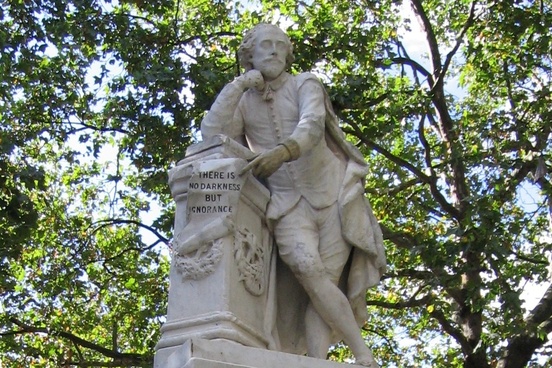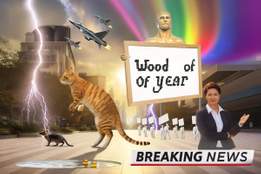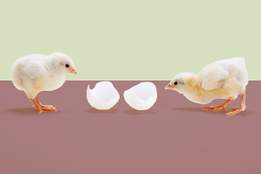
Green-Eyed Monster
What it means:
envy, jealousy
How Shakespeare Used It:
The evil Iago plants doubts in Othello's mind about his wife's faithfulness, while advising him, "O, beware, my lord, of jealousy! / It is the green-eyed monster which doth mock / The meat it feeds on." (Othello, Act 3, Scene 3)
Shakespeare may be evoking cats here - those often green-eyed creatures who toy with their prey before killing it (i.e., mock the meat they feed on).
At the same time, green also suggests not only immaturity, as in a plant's new growth, but also sickly complexions.
Modern example:
".... if jealousy wasn't a factor, three out of every four married people were highly satisfied with the emotional facets of their marriage. However, when the 'green-eyed monster' entered the mix, levels of satisfaction dropped to less than half for married folk." -Michelle Lodge, HealthDay.com, Feb. 12, 2010
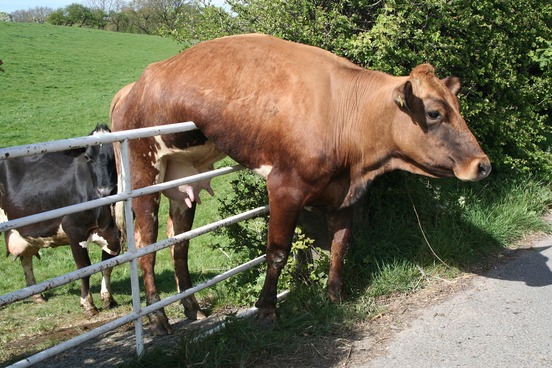
In a Pickle
What it means:
in a jam; in a difficult or unpleasant situation
How Shakespeare Used It:
In The Tempest, King Alonso asks his jester, Trinculo, "How camest thou in this pickle?" And the drunk Trinculo - who has indeed gotten into trouble - responds "I have been in such a pickle since I saw you last ..." (Act 5, Scene 1)
One theory has it that the phrase in a pickle entered English from an old Dutch expression that translates as something like "sit in the pickle," i.e., get stuck in the brining solution used to make pickles.
Shakespeare is probably also playing on the fact that alcohol, which is sometimes used in the pickling process, has certainly contributed to the pickle Trinculo is in.
Modern example:
"Has the NYT got itself into a pickle over digital editions on Kindle and iPad?" -adamhodgkin on Twitter, May 6, 2010
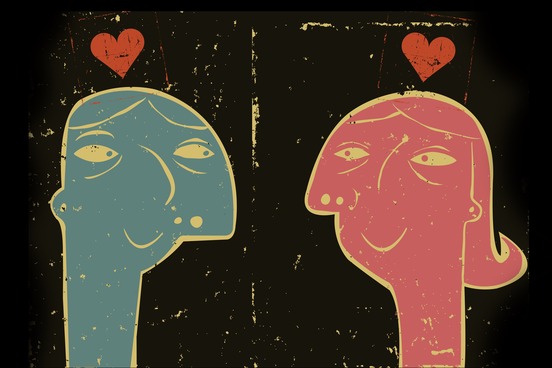
Love Is Blind
What it means:
This phrase has more than one meaning: we overlook flaws in those we love (that's good), but love can blind us to serious issues (that's bad).
How Shakespeare Used It:
In The Merchant of Venice, Jessica is shy about her beloved Lorenzo seeing her disguised as a boy, but recognizes that it won't affect his love for her, saying, "But love is blind and lovers cannot see / The pretty follies that themselves commit ..." (Act 2, Scene 6)
(The phrase also appears in Henry V and The Two Gentlemen of Verona.)
Modern example:
"Jonathan Rhys Meyers thinks love is blind. The actor ... thinks it is easy to fall for someone without knowing much about them, just like his alter-ego does...." -ShowbizSpy.com, Feb. 7, 2010

Salad Days
What it means:
one's youth or heyday
How Shakespeare Used It:
In Antony and Cleopatra, Cleopatra recalls her relationship with Julius Caesar that occurred during, "My salad days, / When I was green in judgment...." (Act 1, Scene 5)
Originally, English speakers used salad days with Cleopatra's meaning: a time of youthful inexperience or indiscretion. These days, however, it usually means "an early flourishing period" - in other words, a heyday.
Modern example:
"I know there are some people who still think this show is good, or watchable.... Just because there are a few cool things left from the salad days doesn't mean Heroes isn't a mess." -Darren Franich, EntertainmentWeekly.com, Nov. 10, 2009

Wear My Heart on My Sleeve
What it means:
to display feelings openly
How Shakespeare Used It:
Discussing his planned betrayal of Othello, the villain Iago says, "But I will wear my heart upon my sleeve / For daws to peck at: I am not what I am." (Othello, Act 1, Scene 1)
In fact, Iago does not display his feelings for birds to peck at: his true feelings will never be revealed.
Modern example:
"I wear my heart on my sleeve and confessed my true feelings to a man who did not reciprocate. Now I am free to move on ..." -Daydreamin on Twitter, Mar. 12, 2010

There's the Rub
What it means:
that's the problem
How Shakespeare Used It:
In Hamlet's famous "To be or not to be" soliloquy, "ay, there's the rub" is the tormented prince's acknowledgement that death may not end his difficulties because the dead may perhaps still be troubled by dreams. (Hamlet, Act 3, Scene 1)
(The original rub predates Shakespeare. On the smooth grassy greens used in lawn bowling, a rub was a bump or uneven area that could send balls off course.)
Modern example:
"There's the rub. What does a progressive institution like Smith [College] do when Barbara decides to become Bert? It's a problem." -Roger Kimball, The New Criterion, May 2005

Cruel to Be Kind
What it means:
helpful but perceived as hurtful
How Shakespeare Used It:
"I must be cruel only to be kind; / Thus bad begins, and worse remains behind," says the tormented Hamlet. He has just mistakenly killed Polonius, and it's clear that he doesn't know how bad things are going to get. (Hamlet, Act 3, Scene 4)
Modern example:
"The government has portrayed the cull [of 400 kangaroos] as a necessary case of being cruel to be kind, but the international focus has been mostly on the cruelty." -Tim Johnston, New York Times, Mar. 14, 2008
Plus: The Nick Lowe song of that title from 1979.
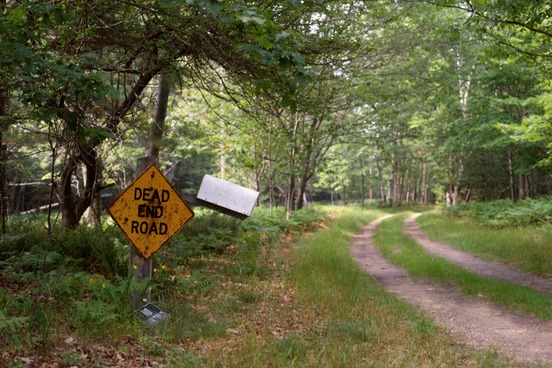
Wild Goose Chase
What it means:
complicated and fruitless pursuit or search
How Shakespeare Used It:
In Romeo and Juliet, Mercutio likens the rapid exchange of jokes between Romeo and himself to the cross-country horse race of Shakespeare's time, known as the wild goose chase, in which any number of riders tried to keep up with and accurately follow the lead rider's course:
"Nay, if our wits run the wild-goose chase, I am done; for thou / hast more of the wild goose in one of thy wits than, I am sure, I / have in my whole five." (Act 2, Scene 4)
The name of the race derives from its similarity to the flight of geese in formation, with a group of geese following behind a leader that sets the course.
Modern example:
"Seriously just went on a wild goose chase for a place to study. Everything is packed so I found an empty classroom in the math building." -TheHeartquake on Twitter, May 11, 2009

Dogs of War
What it means:
the horrors of war
How Shakespeare Used It:
In Julius Caesar, Act 3, Scene 1, a grief-stricken Mark Antony predicts that the instability following Caesar's murder will result in civil war: "Cry 'havoc!' And let slip the dogs of war!"
("Cry havoc" was the military order for soldiers to seize plunder from an enemy.)
Modern example:
"If you doubt that Obama is about to let slip the dogs of war, you need only look back at what he said as a long-shot presidential hopeful in a controversial August 2007 foreign policy speech." -James Gordon Meek, New York Daily News, May 10, 2010
Dogs of War has also been used in the titles of songs, video games, novels, and films.
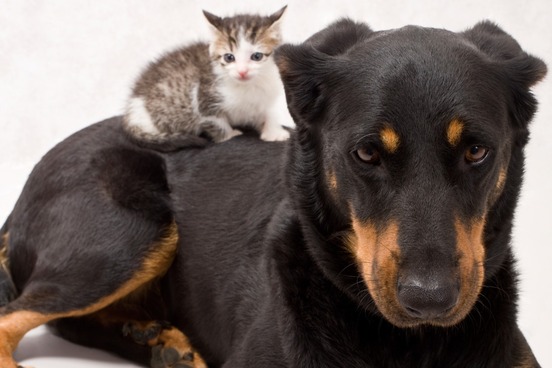
Strange Bedfellows
What it means:
unlikely alliance
How Shakespeare Used It:
When Trinculo seeks shelter from a storm under the cloak of a creature he's very unsure about - he wonders if it's a man or a fish - he comments "misery acquaints a man with strange bed-fellows." (The Tempest, Act 2, Scene 2)
Modern example:
"But there's another key reason Philip Morris lobbied hard for FDA regulation, aligning itself with strange bedfellows like the Campaign for Smoke-Free Kids [and] the American Lung Association ..." -Kate Pickert, Time, June 12, 2009
People love to attribute these words to Shakespeare. They're wrong.
SEE THE LIST >
